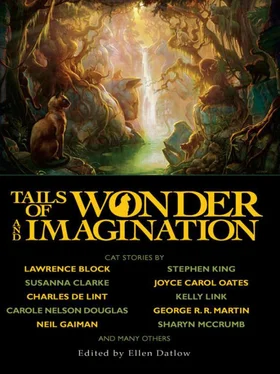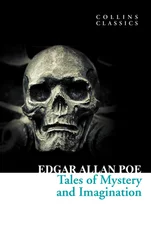Ellen Datlow - Tails of Wonder and Imagination
Здесь есть возможность читать онлайн «Ellen Datlow - Tails of Wonder and Imagination» весь текст электронной книги совершенно бесплатно (целиком полную версию без сокращений). В некоторых случаях можно слушать аудио, скачать через торрент в формате fb2 и присутствует краткое содержание. Год выпуска: 2010, ISBN: 2010, Издательство: Night Shade Books, Жанр: Фэнтези, Фантастика и фэнтези, Ужасы и Мистика, на английском языке. Описание произведения, (предисловие) а так же отзывы посетителей доступны на портале библиотеки ЛибКат.
- Название:Tails of Wonder and Imagination
- Автор:
- Издательство:Night Shade Books
- Жанр:
- Год:2010
- ISBN:978-1-59780-170-6
- Рейтинг книги:5 / 5. Голосов: 1
-
Избранное:Добавить в избранное
- Отзывы:
-
Ваша оценка:
- 100
- 1
- 2
- 3
- 4
- 5
Tails of Wonder and Imagination: краткое содержание, описание и аннотация
Предлагаем к чтению аннотацию, описание, краткое содержание или предисловие (зависит от того, что написал сам автор книги «Tails of Wonder and Imagination»). Если вы не нашли необходимую информацию о книге — напишите в комментариях, мы постараемся отыскать её.
collects the best of the last thirty years of science fiction and fantasy stories about cats from an all-star list of contributors.
Tails of Wonder and Imagination — читать онлайн бесплатно полную книгу (весь текст) целиком
Ниже представлен текст книги, разбитый по страницам. Система сохранения места последней прочитанной страницы, позволяет с удобством читать онлайн бесплатно книгу «Tails of Wonder and Imagination», без необходимости каждый раз заново искать на чём Вы остановились. Поставьте закладку, и сможете в любой момент перейти на страницу, на которой закончили чтение.
Интервал:
Закладка:
There was a six week pre-West End tour and I must admit that I completely forgot about Yolande until the last week at Cardiff when, half an hour before curtain up on the Thursday I was summoned through the loudspeaker in my dressing room to the phone at the stage door. There was a call for me.
It was one of Yolande’s odd friends—the aromatherapist, I think—and how she had managed to track me down to the Theatre Royal Cardiff, I do not know. She told me that the previous day the couple in the flat above Yolande’s had heard this howling and scratching on the door of Yolande’s flat, obviously the wretched cat Roddy in some distress. They tried calling Yolande but got no reply. To cut a long story short, the police were summoned and when they broke down the door they found Yolande lying on the bed, dead. She’d taken enough barbiturates to kill a horse. Roddy the cat had gone frantic with hunger and everything and the place stank of his poo, but he hadn’t touched Yolande’s body.
I went through the performance that night in a daze, wondering when and how I should tell Roddy. In the end I funked it altogether. The following evening I was standing in the wings waiting to go on and begin the play when I became aware of Roddy lurking behind me.
He said: “You’ve heard about Yolande?” I nodded. He said: “I’ve been rather knocked endways by it all. The Company Office rang and told me this afternoon. Someone there had seen a paragraph in the Evening Standard. I can’t understand it, can you?”
I shook my head.
“I mean, I know she was out of work and all that, but… She must have had some sort of mental trouble. A breakdown. Terrible. She was a dear, sweet thing. Not without talent.” There was a pause, then he said: “You know, Godders, I hate to say it, but young people today, they don’t seem to have the backbone. They give up too easily. I mean, we’ve all had our bad patches in this profession, God knows, but you need a bit of grit and spunk to stick to it. Don’t you agree?” To my shame I nodded and Roddy gave me a great bear hug.
The next minute the lights had gone up on stage and I was striding into another world as Kent and uttering the first words of the play: “I thought the King had more affected the Duke of Albany than Cornwall.”
Roddy never mentioned Yolande again in my presence, but I believe there was a moment that night at the end of the play when perhaps he remembered her. It came in the final scene when he is on the ground, lamenting over the dead body of Cordelia and I am in attendance, and he says the words:
“A plague upon you, murderers, traitors all!
I might have saved her; now she’s gone for ever.”
At that moment he did something he’d never done before, he looked up at me. There were tears in his eyes, and they were not stage tears. I like to think they weren’t.
So we moved to our London venue, the Irving Theatre in The Strand, for a limited run of three months, and the critics fortunately decided that Roddy was a great Lear. All the same, after the exhilaration of the tour when we were all discovering how good the show was, the West End run seemed to be a bit flat, and, of course, because in London most of the cast had their own homes to go to and their own lives to lead, some of the camaraderie in the company went too.
I didn’t particularly like the Irving. It’s big, draughty old Victorian building, perhaps even a little sinister, and it had, of course, a theatre cat. They’re vital things you know, because theatres get rats, and rats gnaw cables, and gnawed electric cables start fires, especially in theatres. The Irving cat was a black Tom called Nimrod, not a very sociable beast, but, as befitted his name, a “mighty hunter before the Lord” who kept the rats and mice down very effectively. But here’s a funny thing: about a week into our run Nimrod disappeared.
The theatre manager was very distressed and offered a reward for his discovery and return. There was even a bit in the papers about it. I wouldn’t have mentioned this only it may have a bearing on what happened next.
Fortunately, the disappearance of Nimrod did not result in a rodent invasion. In fact—and this was something that puzzled many of us—the odd half-eaten rat or mouse could still be found in odd corners of the theatre, if anything with more frequency than before Nimrod’s vanishing act. These grisly remains, which had been left around by Nimrod as tokens of his prowess, were now nearly always to be found either in the wings or in the corridor leading to Dressing Room Number 1, Roddy’s of course. In fact Roddy came in one day for a matinee to find a headless rat carefully placed on the very threshold of Number 1. He made a terrific fuss about that, as he had every right to, of course, but I thought there was a touch of hysteria in his manner which was uncharacteristic. He didn’t usually play the Prima Donna.
A couple of days later Roddy happened to meet me back stage in the interval and invited me to his dressing room for a whisky. The one he poured himself was unusually large. He’d never been a boozer, and certainly not during a show. He seemed to be under some sort of strain.
Having sat me down, he said: “Now, then, Godders, what are we going to do about this cat business?” I looked blank. He said: “Don’t tell me you haven’t noticed this damned cat which keeps following me around the theatre?”
I said that I hadn’t seen any cat and anyway—didn’t he know?—Nimrod had disappeared. Roddy banged his glass impatiently down on the dressing table.
“Yes! Yes! I know all about Nimrod. That damn theatre manager is obsessed with Nimrod. I didn’t mind Nimrod. He kept out of your way and did his job. This is a different cat altogether. It won’t leave me alone. It keeps coming up to me just as I’m going on stage and purring, and doing that thing that cats do, you know, curling itself round your legs. It nearly tripped me up the other day just as I was going on for ‘Blow Winds!’ It’s a blasted nuisance. And it keeps leaving these offerings for me in my dressing room. You know, bits of disemboweled rat and mouse. I trod on an intestine with my bare foot the other day as I was changing. Ugh! I can’t think how the bugger gets in. I always lock my dressing room when I go. I suppose it must be the cleaners. I’ve spoken to the manager about it but he hasn’t a clue. He’s so obsessed about Nimrod I don’t think he believes in this other cat.”
I asked what it looked like.
“Funny sort of colour. I don’t know. Greyish, I think, but these sort of yellow eyes which look as if they light up in the dark. You know how some cats seem to have luminous eyes. It’s difficult to tell exactly what it looks like because I haven’t seen it in full light. It usually turns up in the wings, just outside the glare of the stage lights. I wouldn’t mind only—I know this is a funny thing to say—it’s so damned fond of me. It’s obsessed. It’s like, you know, some creepy sort of stalker. Godders, you must have seen it.”
There was pleading in his voice, but I had to confess that I hadn’t. To reassure him I said I said I would keep “a weather eye” open for it. He liked that: a nautical expression, you see, “weather eye.”
In the final scene that night an odd thing happened. Lear has come on with the dead body of Cordelia and we’re standing around. Roddy was doing pretty well, but not on top form, I thought. He kept looking off-stage. Then comes his final speech when he is lamenting over the dead Cordelia and he says:
“Why should a dog, a horse, a rat have life,
And thou no breath at all?”
Читать дальшеИнтервал:
Закладка:
Похожие книги на «Tails of Wonder and Imagination»
Представляем Вашему вниманию похожие книги на «Tails of Wonder and Imagination» списком для выбора. Мы отобрали схожую по названию и смыслу литературу в надежде предоставить читателям больше вариантов отыскать новые, интересные, ещё непрочитанные произведения.
Обсуждение, отзывы о книге «Tails of Wonder and Imagination» и просто собственные мнения читателей. Оставьте ваши комментарии, напишите, что Вы думаете о произведении, его смысле или главных героях. Укажите что конкретно понравилось, а что нет, и почему Вы так считаете.












